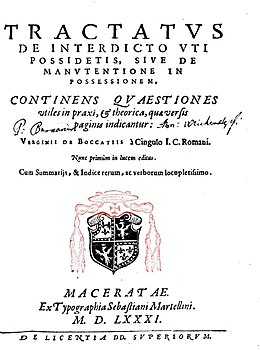保持佔有
外觀

保持佔有(拉丁語:uti possidetis),亦稱佔領地保有,是國際法中的一項原則,主張除非條約另行規定,否則交戰國在戰爭結束後可以保有其在戰爭期間藉由武力所佔有的領土和財產。[1]
與保持佔有相對的國際法原則為戰前狀態(拉丁語:status quo ante bellum),主張交戰各方恢復到戰爭發生前的勢力狀態。戰爭結束時,敵對雙方簽訂的條約可以採納保持佔有原則,或戰前狀態原則,或兩者之組合。如果條約對於藉由武力所佔領的領土和財產之歸屬沒有特別規定,則以保持佔有原則優先。[1]
保持佔有原則是古典國際法承認的領土移轉方式,但晚近則不再承認其為取得領土的合法方式,或對其取得領土的法律效力有所爭論[2]。隨着《聯合國憲章》於1945年問世,藉由武力取得領土違反《聯合國憲章》,因此保持佔有原則已不再是取得武力征服之領土的可行方式[3][4]。
註釋
[編輯]- ^ 1.0 1.1 Uti possidetis Law & Legal Definition. USLegal, Inc. (uslegal.com). [16 August 2010]. (原始內容存檔於2017-08-19).
- ^ 李明峻. 從國際法角度看琉球群島主權歸屬 (PDF). 台灣國際研究季刊. 2005年6月, 1 (2): 59 [2016-06-20]. (原始內容存檔 (PDF)於2017-01-06).
- ^ Fozia Lone. Uti Possidetis Iuris. Oxford Bibliographies. March 23, 2012 [June 20, 2016]. doi:10.1093/obo/9780199796953-0065. (原始內容存檔於2020-11-21) (英語).
However, with the adoption of the UN Charter in 1945, uti possidetis no longer served as a justified principle to seal title to territory acquired by conquest.
- ^ Giuseppe Nesi. Uti possidetis Doctrine
 . Oxford Public International Law. January 2011 [June 20, 2016]. (原始內容存檔於2020-10-30) (英語).
. Oxford Public International Law. January 2011 [June 20, 2016]. (原始內容存檔於2020-10-30) (英語). This notion of uti possidetis is no longer viable since the well-established principles on the use of force do not allow for any acquisition of territory that is in violation of the United Nations Charter.
參考文獻
[編輯]- Sebastian Anstis and Mark Zacher (June 2010). "The Normative Bases of the Global Territorial Order." Diplomacy and Statecraft 21: 306–323.
- Helen Ghebrewebet: "Identifying Units of Statehood and Determining International Boundaries: A Revised Look at the Doctrine of Uti Possidetis and the Principle of Self-Determination", Verlag Peter Lang 2006, ISBN 3-631-55092-8.
參見
[編輯]外部連結
[編輯]- Lecture (頁面存檔備份,存於互聯網檔案館) by Marcelo Kohen (頁面存檔備份,存於互聯網檔案館) entitled "Uti Possidetis and Maritime Delimitations" in the Lecture Series of the United Nations Audiovisual Library of International Law (頁面存檔備份,存於互聯網檔案館)
